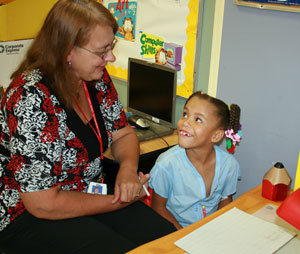 |
Eva Meinke, the teacher at The Nebraska Medical Center’s “Too Cool Hospital School,” with 7-year-old Nya Mohammed Solomon, a second-grader who is being treated for cystic fibrosis at the medical center. |
The Nebraska Medical Center’s “Too Cool Hospital School” enables long-term care patients to continue their studies during their stay at the hospital.
“Just because these children are hospitalized doesn’t mean they should miss big events like their first day of school,” said Eva Meinke, the hospital school teacher.
The K-12 school provides direct instruction, tutoring and coordination with the children’s home school districts.
“We work with school districts all over the nation,” Meinke said. “Some districts leave it up to me to decide on the curriculum for the student. Other districts will send classroom work and assignments.”
Patients who attend the school are children who are in the hospital for an extended period of time.
“Some students may be in the hospital for the whole school year so they attend our school for a full year,” Meinke said.
These students include children with cancer and cystic fibrosis, children receiving pre and post transplant care and children receiving care through the medical center’s intestinal rehabilitation program.
The students attend one hour classes every day in the hospital classroom or they receive private instruction in their hospital rooms.
Before students start receiving instruction in the hospital school, they are assessed for their current level of performance.
“It’s important to determine what type of instructional intervention will best assist the student in making academic progress. We cannot complete in one short hour what a patient’s classmates are doing in an all day session,” Meinke said. “But, we work hard at developing essential math and reading concepts.”
A former Norfolk Senior High School English teacher and University of Nebraska at Omaha instructor, Meinke has been teaching at The Nebraska Medical Center’s hospital school since 1989.
“It’s an extremely rewarding job,” Meinke said. “Many of these students are facing challenges we can’t even imagine because of their illnesses.”
She recalls one student in particular who was battling cancer.
“At first this student didn’t want to study or participate in school work because she thought her chances for long-term survival were grim,” Meinke said. “But I challenged this student to work toward the goal of receiving her high school diploma. She was a high school sophomore at the time. The challenge gave her a focus other than her illness, and it provided her some normalcy during her months in the hospital.”
Full credit at her home school was given for work completed at the medical center’s hospital school.
“I was there the day she walked across the stage with all of her other classmates to receive her high school diploma,” Meinke said. “Two months after graduation, the student passed away, but she and her family were so proud of that accomplishment.”
Meinke said a big part of her job is helping with the transition when children are well enough to leave the hospital and return to their home schools.
“Many of these students fear being laughed at if they’ve fallen behind their peers,” Meinke said. “My goal is to keep them on target with their school curriculum so they won’t struggle when they go back. It’s amazing to see how hard some of these kids work.”
Another important focus of the hospital school doesn’t involve school work, but instead building social skills.
“Some of these children have spent more time in a hospital than they have in school, or even their own homes. Many times, they are used to being the center of attention,” Meinke said. “We work to teach these children how to share and take turns.”
About 20 school-aged patients are enrolled in the hospital school at any given time. The words on a plaque on Meinke’s desk from a former student is a daily reminder of the important role she plays in each of these children’s lives.
“I couldn’t have made it without you!”